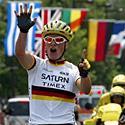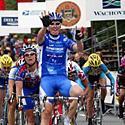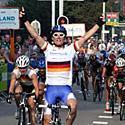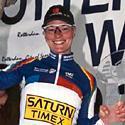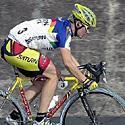
Recently on Cyclingnews.com |
An interview with Petra Rossner, September 10, 2004
A fond farewell
One of the most successful careers of modern cycling comes to a close this season as German sprinter Petra Rossner hangs up her cleats to change roles within the Nurnberger team from winning races to directing others across the finish line. Kristy Scrymgeour looks back with Rossner on a stellar career, and forward to directeurship and motherhood.
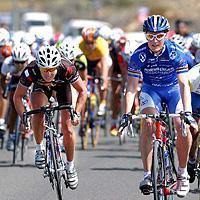 |
It's been a 20-year journey for Petra Rossner, with nine World Cup victories, an Olympic gold medal and a world championship among her 300 top-level victories. Rossner has also been responsible for one of the most thorough dominations of a single race by any athlete, winning seven of the last eight editions of the Liberty Classic, the women's race that runs alongside the USPRO men's championships in Philadelphia every year.
With Rossner calling an end to a career that demands the adjective "illustrious", we had to kick off with the obvious question...
Cyclingnews: How do you feel about retiring from the sport of cycling?
Petra Rossner: I feel a little bit happy and a little bit sad. I'm looking forward to the next phase of my life and I achieved most of the things I wanted to achieve in my career. I would have loved to win road worlds because I think its one of the hardest things to win. Harder than Olympics, harder than a track world championship I think.
CN: When do you think you came closest to wining this race?
PR: I can't really say. I had my chances and I don't want to make any excuses. Some years I had bad luck, like when I crashed in Zolder [2002] and other years I was just perhaps not fit enough.
I'm not sad that I am leaving the sport without winning this. It was just something I dreamed about doing when I was young and that I would have liked to have done.
|
|
|
|
|
|
|
|
|
CN: What do you consider the best part of your career?
PR: There have been a lot of moments that made me proud and emotional in my career. Not all of them are of me winning personally. The year Anna [Millward] won the Idaho Tour when [Jeannie] Longo and [Diana] Ziliute were stronger. That was the best tactical performance by a cycling team in the world. We had a plan, it worked well and I will always remember that as one of my best moments in cycling.
The other thing I am proud of is the fact that I was able to perform under pressure. In Philadelphia every year there was a lot of pressure on me as that is the race that Saturn hired me to win. When everybody assumes you can win, you really have to do it, you can't make any mistakes anymore.
CN: Why have you decided to retire now?
PR: The last five years I always knew I would leave it open and take it year by year. People told me 'you will feel it when the time comes,' but I didn't feel it. I still love racing and I am still doing okay in the races, so I could continue, but I'm 37 now, going on 38 and my body clock is ticking.
I have always wanted to have a child and that is the most important thing for me right now. People have been trying to convince me to ride because now that I'm retiring there will be no German National champion racing in the peloton until June. I've had offers to, but no amount of money will convince me to ride now. I want to get pregnant before I'm 40.
CN: Is directing a team something you've always wanted to do?
PR: I have a lot of interests so it's not necessary that I have to work in cycling but a good situation has come up with Nurnberger. What really convinced me to do it is more that the girls asked me to do it.
I hope I can learn quickly and I hope I can do a good job. The situation is good. I can work together with Jens and we can do half the races each and learn a lot from each other.
CN: Do you consider this new career as giving back to the sport of cycling?
PR: I have a lot to give and I think there are many things that we can do better that don't cost anything. I want to try to make cycling better for women. Cycling is more of a lifestyle than a job for many women and it's hard. It can ruin people because of the pressure. Riders can develop eating disorders and depression because of that pressure. I want to make the riders in the team happy. I think I have a good feeling about what riders need and what staff members need having been involved in cycling for so long.
One thing is that people are different. You have to be tolerant and open-minded and realize that every rider is different.
CN: What will be the aims for your team in your first year as director?
PR: Well first of all, the people with a contract in the team at this point are already very good bike riders. That is just a fact. So my goal is to make them happy and make things better for them and the sponsors and in turn the cycling scene. It is important that they want to race and it is important that the chemistry in the team is good. You will always have problems but you have to find a way to solve problems and for that you need to talk a lot within the team. If the riders are happy, the team will run itself and that's my goal.
I have observed that in most teams the pressure is too high.
CN: In your opinion, how is the state of women's cycling in the world right now?
PR: I have been lucky in that I have been a part of two very good teams. I had three years with Saturn and three years with Nurnberger, but teams are not always that healthy. We have a big sponsor behind us and we want to set an example about how it should be. I think things are picking up internationally. The last couple of years have been a bit down with some big races stopping, but next year there will be more races so its going to get better.
CN: What do you think is the key to keeping the sport alive?
PR: I believe that it's important to get the team spirit going. People achieve more out of their careers if they are team players. I achieved at the Olympics in an individual event and that is a good feeling because you are still part of a team of good staff, but the happiness of success when you do it as a team is so much more. You just can't compare it.
CN: How is the team looking for next year?
PR: For the team we also have a base of five riders picked and Jens and I will decide the rest of the team with the help of those five riders. I don't believe only the director should decide. I believe the riders need to be involved in the decision too. We wanted to have a base of five first and we will choose eight more. We are a German registered team so we cannot have more than four foreigners.
CN: What can you say to sum up your career?
PR: It was a wonderful twenty years with a lot of ups and downs and it made me a better person
CN: What have you got to say to young girls who are interested in taking up cycling as a career?
PR: Do it! It's more that you can learn at university. Of course I had both and if you can do both then that's better, but cycling makes your life so much richer. Your knowledge of the world and getting to know people around the world is invaluable.
A lot of sports give you that experience, not just cycling, but team sports especially. You have to learn to work with other people in high-pressure situations. You learn to sort out problems. I'm not saying that you can't be yourself. You can always be yourself, but in a team situation you learn to give as well as take.

